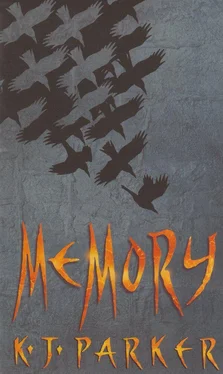K Parker - Memory
Здесь есть возможность читать онлайн «K Parker - Memory» весь текст электронной книги совершенно бесплатно (целиком полную версию без сокращений). В некоторых случаях можно слушать аудио, скачать через торрент в формате fb2 и присутствует краткое содержание. Жанр: Фэнтези, на английском языке. Описание произведения, (предисловие) а так же отзывы посетителей доступны на портале библиотеки ЛибКат.
- Название:Memory
- Автор:
- Жанр:
- Год:неизвестен
- ISBN:нет данных
- Рейтинг книги:5 / 5. Голосов: 1
-
Избранное:Добавить в избранное
- Отзывы:
-
Ваша оценка:
- 100
- 1
- 2
- 3
- 4
- 5
Memory: краткое содержание, описание и аннотация
Предлагаем к чтению аннотацию, описание, краткое содержание или предисловие (зависит от того, что написал сам автор книги «Memory»). Если вы не нашли необходимую информацию о книге — напишите в комментариях, мы постараемся отыскать её.
Memory — читать онлайн бесплатно полную книгу (весь текст) целиком
Ниже представлен текст книги, разбитый по страницам. Система сохранения места последней прочитанной страницы, позволяет с удобством читать онлайн бесплатно книгу «Memory», без необходимости каждый раз заново искать на чём Вы остановились. Поставьте закладку, и сможете в любой момент перейти на страницу, на которой закончили чтение.
Интервал:
Закладка:
At least the turf houses at the foundry were better than the horrible little dirt dog-kennels at the charcoal-burners' camp. The foundry had been in business for over a century, and the workers' houses had to be at least forty years old, if not older; long enough for the turf to put down roots and knit together nicely. The foundrymen were almost proud of them, in a way. It wasn't everybody, they said, who lives in a living house, with walls and a roof that grow, even if it is a bit like living in your own grave.
Poldarn was shaken out of a dream about something or other he couldn't remember by Banspati the foreman. 'You're back, then,' he said, looming over Poldarn like an overhanging cliff.
'Looks like it,' Poldarn mumbled. 'What's the time?'
Banspati grunted. 'Some of us've been up for hours,' he said. 'So, how did you get on?'
The question puzzled Poldarn for a moment; then he remembered. The charcoal. He tried to recall how all that had turned out. 'It's all right,' he said. 'We did the deal.'
'Fine,' Banspati said. 'What deal?'
Pulling the details out of his memory was like levering an awkward stone out of a post-hole. 'They can let us have all we need,' he said, 'two quarters a bushel on the road, tenth off for cash on delivery, half a quarter a bushel penalty for failure to deliver. The quality's good,' he added, 'I think. Looked all right to me, anyhow.'
Banspati nodded slowly. 'That's more or less what we decided on,' he said. 'Dunno why you had to go all that way when we'd already settled it here. Still, that's that sorted.'
Poldarn wanted to point out that the trip hadn't been his idea, but he couldn't face the effort of putting it into words. 'Yes,' he said. 'First load should be with us by the end of next month. The bloke said they're rushed off their feet, but he was lying. I think they were glad of the business.'
'You bet. Who wants charcoal round here, except us? Probably we could've got it cheaper if you'd sweated 'em a bit, but it's all settled now, so never mind. Good trip?'
'No.'
'Get yourself together, and get down to the shop. The Vestoer job's all done, bar scouring and polishing, so you'd better get a move on.'
Poldarn nodded, and reached for his boots. His head hurt, but there wasn't any point in mentioning that.
Besides lifting things and hauling on ropes and shovelling wet clay into buckets when the need arose, Poldarn's main job at the bell foundry was the forge work, making brackets and mountings and clappers; none of which could be made and fitted until everything else had been done, by which time the job was usually a month or so late. Somehow matters had so resolved themselves that every late delivery was officially his fault, and he didn't mind that particularly, nor the fact that he was always having to do difficult and delicate work in a hurry. Just this once, however, he'd have preferred it otherwise. He wasn't really in the right frame of mind for concentrating on precision work. But he hauled himself to his feet nevertheless. There was some bread in the crock, but it had gone a funny shade of green, and the water in the jug had flies and stuff floating in it. Skip breakfast, he thought, and I can wash my face in the slack tub when I get there. He tied on his leather apron and shoved through the door into the yard.
As usual, the yard gave no indication that thirty or so men worked there, or that there was anybody around the place at all. To Poldarn's left and in front of him were the abnormally tall timber-framed sheds, with high lintels and curved doors, where the carpenters made patterns and jigs, and where the half-finished bells were ground, polished and accoutered; away to the right was the muddy wilderness of casting pits and furnace cupolas. He was halfway across before anybody else appeared: an old man and three boys, hauling sand up from the river in wheelbarrows. He didn't recognise them, and if they knew him they didn't show it. He reached the forge, unlatched the heavy door and went inside.
It was, of course, dark in the forge; shutters closed and bolted, no light other than the splinter of sun from the doorway. On his way he grabbed a sack of charcoal, which he heaped around the little pile of kindling he'd left there a few days ago. For once, the tinderbox was where he'd left it, and the kindling caught quite easily. He hadn't had much trouble getting a fire started, not since the night at Ciartanstead when he'd murdered Eyvind.
As Poldarn drew in the coals with the rake, he tried to clear his mind of all extraneous concerns. Making the clapper for a bell involved careful thought. Both the length and the weight had to be exactly right, or the note would be false. He could either draw the thing down in one piece from a thick bar and swage the round bulb that actually made contact with the bell, or else he could use thinner stock and forge-weld bands around it to form the bulb. Quicker the second way, less heavy work, but considerably trickier, because of the weld. Because he was always in a hurry, he always ended up doing it the second way, and this time looked like no exception. A pity, but there it was.
If only Halder could see me now, he thought; his grandfather had kept on at him to learn the trade (relearn it, rather, since he'd been taught it as a boy and since forgotten it, until after the burning at Ciartanstead, by which point Halder was dead and Poldarn no longer needed the skill). Or Asburn, the real smith at Haldersness, who'd tried to teach him and failed; Asburn could've done four awkward welds one after the other without turning a hair. But Asburn wasn't here, and if he was they'd cut his head off for being a raider. Poldarn took the lid off the flux jar. Just about enough, if he was sparing with it (and that was the wrong approach).
In spite of the lack of flux, the welds took, rather to his surprise. Oddly enough, it seemed as though he was starting to get good at this, now that he was just an employee of the foundry rather than the master of Haldersness and Ciartanstead. Another slight miscalculation with past and present; story of his life, apparently.
Once he'd made the basic shape, he stopped. No point going any further until he'd measured up the bell and spoken to Malla Ancola, the chief founder, who'd have worked out how long and heavy the clapper had to be. Annoying; should have done that before he started, because now he'd have to let his fire burn out. Waste of time and good charcoal, and that was what came of not giving your full attention to the job in hand. Never mind the past, or the future; you had to concentrate on the present, and on the work you were supposed to be doing.
Malla didn't look like a foundryman; he should have been either a prince or a poet, ideally both. He was tall and slim, with long, delicate hands, a smooth round face and, most of the time, a profoundly gormless expression, as if he'd just been interrupted in the middle of composing an ode by a courtier needing something signed.
'You're back, then,' he said, as Poldarn edged his way past the grinding-house door, which had stuck at slightly ajar since the accession of the dynasty before last. 'Any luck with the charcoal people?'
(Malla even sounded like a poet; low-voiced, quiet, droopy. The accent wasn't necessarily a problem. Even Tulicers wrote poetry sometimes.)
'All settled,' Poldarn replied briskly. He knew from experience that getting into any kind of conversation with Malla was a fatal mistake if you ever wanted to get some work done. Malla could talk about anything, indefinitely. 'I'm just doing the clapper now, so I need some measurements.'
'Ah,' Malla replied. 'Right. She's over here. We'll be making a start on grinding her directly.' Poldarn sighed. Making a start meant that Malla was just beginning to think about it; like a god at the creation of the world, he was opening his mind to the vague, inchoate possibility of the existence of shapes and forms. In other words, he hadn't got round to figuring out the measurements yet. Before he did that, he'd need to prune away the rough, gritty skin of casting waste, which might be anything up to an eighth of an inch deep. Until he knew precisely how thick the walls of the bell would eventually be, he couldn't calculate anything. If this world was going to take a week to create, Malla was still in the mid-afternoon of the second day, turning over in his mind what colour the sky should be.
Читать дальшеИнтервал:
Закладка:
Похожие книги на «Memory»
Представляем Вашему вниманию похожие книги на «Memory» списком для выбора. Мы отобрали схожую по названию и смыслу литературу в надежде предоставить читателям больше вариантов отыскать новые, интересные, ещё непрочитанные произведения.
Обсуждение, отзывы о книге «Memory» и просто собственные мнения читателей. Оставьте ваши комментарии, напишите, что Вы думаете о произведении, его смысле или главных героях. Укажите что конкретно понравилось, а что нет, и почему Вы так считаете.












